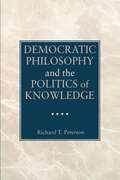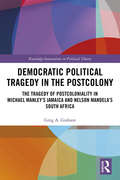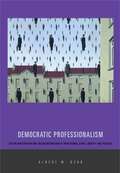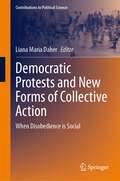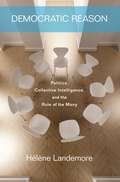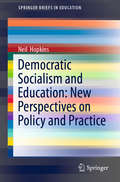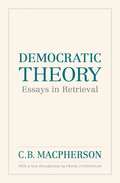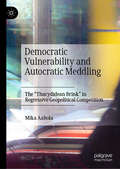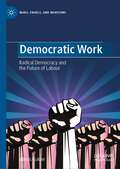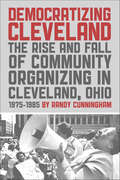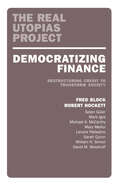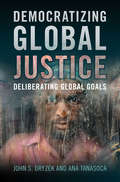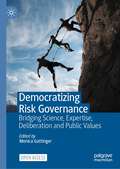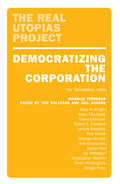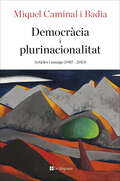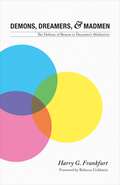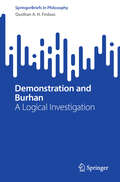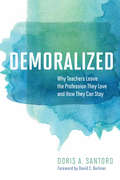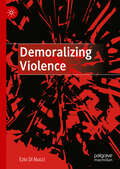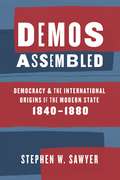- Table View
- List View
Democratic Philosophy and the Politics of Knowledge (G - Reference, Information and Interdisciplinary Subjects)
by Richard T. PetersonDebates over postmodernism, analyses of knowledge and power, and the recurring issue of Heidegger's Nazism have all deepened questions about the relation between philosophy and the social roles of intellectuals. Against such postmodernist rejections of philosophical theory as mounted by Rorty and Lyotard, Richard Peterson argues that precisely reflection on rationality, in appropriate social terms, is needed to confront urgent political issues about intellectuals. After presenting a conception of intellectual mediation set within the modern division of labor, he offers an account of postmodern politics within which postmodern arguments against critical reflection are themselves treated socially and politically.Engaging thinkers as diverse as Kant, Hegel, Marx, Habermas, Foucault, and Bahktin, Peterson argues that a democratic conception and practice of philosophy is inseparable from democracy generally. His arguments about modern philosophy are tied to claims about the relation between liberalism and epistemology, and these in turn inform an account of impasses confronting contemporary politics. Historical arguments about the connections between postmodernist thought and practice are illustrated by discussions of the postmodernist dimensions of recent politics.
Democratic Political Tragedy in the Postcolony: The Tragedy of Postcoloniality in Michael Manley’s Jamaica and Nelson Mandela’s South Africa (Routledge Innovations in Political Theory)
by Greg A. GrahamA ground-breaking work in Africana political thought that links the plight of progressive political endeavors in Africa with those in the Diaspora and beyond, Democratic Tragedy in the Postcolony engages with two of the defining political sagas of the postcolonial era. The book presents Michael Manley of Jamaica and Nelson Mandela of South Africa as tragic political leaders at the helm of popular democratic projects that run aground in the face of the constraints that a subordinate position in the global economy presents for such endeavors. Jamaica’s experiment with democratic socialism as an alternative path to development at the height of the cold war is considered alongside post-Apartheid South Africa’s search for a development model consistent with the demand for civic empowerment and equitable distribution of social goods in the aftermath of Apartheid. Democratic Political Tragedy in the Postcolony theorizes the defining tragic impasse and the telling vacillations by which the postcolonies in question are brought to the neoliberal catastrophes that currently prevail.
Democratic Professionalism: Citizen Participation and the Reconstruction of Professional Ethics, Identity, and Practice (G - Reference, Information and Interdisciplinary Subjects)
by Albert W. DzurBringing expert knowledge to bear in an open and deliberative way to help solve pressing social problems is a major concern today, when technocratic and bureaucratic decision making often occurs with little or no input from the general public. Albert Dzur proposes an approach he calls “democratic professionalism” to build bridges between specialists in domains like law, medicine, and journalism and the lay public in such a way as to enable and enhance broader public engagement with and deliberation about major social issues. Sparking a critical and constructive dialogue among social theories of the professions, professional ethics, and political theories of deliberative democracy, Dzur reveals interests, motivations, strengths, and vulnerabilities in conventional professional roles that provide guideposts for this new approach. He then applies it in examining three practical arenas in which experiments in collaboration and power-sharing between professionals and citizens have been undertaken: public journalism, restorative justice, and the bioethics movement. Finally, he draws lessons from these cases to refine this innovative theory and identify the kinds of challenges practitioners face in being both democratic and professional.
Democratic Protests and New Forms of Collective Action: When Disobedience is Social (Contributions to Political Science)
by Liana Maria DaherFollowing a dialogic and interdisciplinary approach, this book highlights changes in the concept and action of disobedience, presenting a theoretical framework and applied case studies.Disobedience has traditionally been played out through collective actions and protests which configure and propose alternative social scenarios to the status quo. Today, in a changing socio-historical context, disobedience represents a mode of political participation and a form of an active citizenship attempt to correct authoritarian drifts. Furthermore, it often highlights social problems and morally controversial issues. Disobedience is not only a right granted to the individual within democratic systems and/or duty imposed in the interest of society in a pro-social sense, i.e. defense of human rights and a tendency towards equalization, but it also became an alternative process, often symbolic, of construction of reality.The book focuses on a) reconstructing the concept of social disobedience and the field's state of the art from an innovative, contemporary, theoretical, and conceptual perspective and b) analyzing its phenomenology within a specific territorial horizon, with the objective of uncovering social and pro-social aspects related to today’s forms of disobedience. The book therefore will appeal to students, scholars, and researchers of contemporary political theory, political science, democratization studies, social movement studies, criminology, legal theory, and moral philosophy.
Democratic Reason: Politics, Collective Intelligence, and the Rule of the Many
by Hélène LandemoreIndividual decision making can often be wrong due to misinformation, impulses, or biases. Collective decision making, on the other hand, can be surprisingly accurate. In Democratic Reason, Hélène Landemore demonstrates that the very factors behind the superiority of collective decision making add up to a strong case for democracy. She shows that the processes and procedures of democratic decision making form a cognitive system that ensures that decisions taken by the many are more likely to be right than decisions taken by the few. Democracy as a form of government is therefore valuable not only because it is legitimate and just, but also because it is smart. Landemore considers how the argument plays out with respect to two main mechanisms of democratic politics: inclusive deliberation and majority rule. In deliberative settings, the truth-tracking properties of deliberation are enhanced more by inclusiveness than by individual competence. Landemore explores this idea in the contexts of representative democracy and the selection of representatives. She also discusses several models for the "wisdom of crowds" channeled by majority rule, examining the trade-offs between inclusiveness and individual competence in voting. When inclusive deliberation and majority rule are combined, they beat less inclusive methods, in which one person or a small group decide. Democratic Reason thus establishes the superiority of democracy as a way of making decisions for the common good.
Democratic Socialism and Education: New Perspectives on Policy and Practice (SpringerBriefs in Education)
by Neil HopkinsThis book engages with the political, philosophical and policy debates around contemporary democratic socialism and state education. It examines contemporary education and education systems, as well as democratic socialism in the context of the complex political world we live in currently. It takes the reader towards a democratic socialist curriculum and pedagogy, and concludes by investigating democratic socialism and governance in education. Discussing the work of Axel Honneth, Chantal Mouffe and Norberto Bobbio, the book argues that contemporary democratic socialism gives a philosophical and political grounding to the notion of education being more than simply preparation for work or a series of qualifications. It makes the case for education as an exercise in democratic community, and learning as collective citizenship. Taking the curriculum, classroom pedagogy, and educational governance in turn, it offers a series of practical ways in which state education can be re-interpreted and re-applied to emphasise the democratic, collective and creative aspects of learning. "Hopkins contends, firstly, that twenty-first-century democratic socialism must reinvigorate itself by responding to the challenges of liberalism; and, secondly, that a socially just education system must be willing to learn from such a reinvigorated socialism. These twinned theses are clearly and concisely thought through in relation to urgent educational, and more broadly socio-political, issues: contemporary democratic-socialist thought; educational systems (and possibilities for reform); curriculum design; pedagogy; systems and mechanisms of governance. In just a few thousand words, Hopkins’s Democratic Socialism and Education manages to be that rare thing: a book that is both lucid introduction and original contribution. It will surely appeal equally to teachers, philosophers of education, and those engaged in educational action research." Dr. Oliver Belas, Lecturer in Education, School of Education and English Language, University of Bedfordshire, UK
Democratic Theory: Essays In Retrieval
by C. B. MacphersonIn this new, affordable edition of a long out-of-print yet foundational work on twentieth-century political philosophy, renowned philosopher C. B. Macpherson further explores the ideas that he advanced in such previous books as The Political Theory of Possessive Individualism. In Democratic Theory: Essays in Retrieval, Macpherson modifies, extends, and clarifies the concepts of a person's power and the "transfer of powers," arguing that a twentieth-century liberal-democratic theory can be based on an adequate concept of human powers and capacities without insuperable difficulties. He argues that the neo-classical liberalisms of Chapman, Rawls, and Berlin fall short of accomplishing this goal largely because, in different ways, they fail to see or understate the transfer of powers. Macpherson suggests that the liberal theory of property should be, and can be, fundamentally revised in order to accommodate new democratic demands. He establishes the need for a theory of democracy that steers clear of the disabling central defect of current liberal-democratic theory, while recovering the humanistic values that liberal democracy has always claimed. The result is one of the seminal works of twentieth-century political philosophy. A new Introduction by Frank Cunningham situates the work in a twenty-first-century context.
Democratic Vulnerability and Autocratic Meddling: The "Thucydidean Brink" in Regressive Geopolitical Competition
by Mika AaltolaThis book investigates complex regressive dynamics in contemporary Western democracies. They include not only severe polarization in domestic politics, but also efforts by external autocratic powers to co-opt the increasingly digitalized political processes in the West. The discussion on democratic vulnerability and regression has rarely been historically and theoretically reflective. The aim is to fill this relative void by drawing on classical sources to inform about the political anxieties and agitations of our present time as the Western world moves towards new critical elections. The key concept of the analysis, a Thucydidean brink, refers to a critical point where the attraction felt towards an outside geopolitical competitor becomes stronger than the political affinity felt towards one’s domestic political opponent. As political polarization, societal decomposition and the collusive tendencies grow in strength, political factions and political candidates in western societies can be(come) drawn to autocratic actors. Perhaps most alarmingly, the resulting nexus between democracies and autocracies can further intensify mutual regression and form downwards-sloping spirals that are not ultimately under any strategic control. This book draws from the experiences of recent elections in major Western democracies to illustrate the widening and deepening underlying regressive tendency.
Democratic Work: Radical Democracy and the Future of Labour (Marx, Engels, and Marxisms)
by Alexis CukierThis book proposes a radical transformation of labour institutions, in order to lay the foundation for the democratization of society rather than capitalist accumulation. Using an empirical analysis of the contemporary world of work, Alexis Cukier examines the democratic meaning of today’s critique of work organization and questions the theoretical models (linked to class struggles and to industrial democracy) to conceive of a "democratic work." Considering particular historical experiments (such as cooperatives, self-management, worker’s councils) that try to realize democracy at work, this book also analyzes the political issue of "democratic work" in relation to issues such as labour law, feminist struggles and political ecology. Ultimately, this book proposes some institutional paths that could overtake the divide between the rights of the citizens and the rights of the workers, arguing finally: if we really want to radicalize democracy, we should begin with democratizing work.
Democratizing Cleveland: The Rise and Fall of Community Organizing in Cleveland, Ohio 1975–1985
by Randy CunninghamA trenchant history of Cleveland&’s community organizing movements, detailing their origins, campaigns, and legacies. Randy Cunningham, a founding member of the Cuyahoga County Progressive Caucus, spent nearly fifteen years researching grassroots efforts that put neighborhood concerns and voices front and center. In Democratizing Cleveland, he chronicles one of the greatest examples of mass civic and democratic education in Cleveland&’s history. The decade between 1975 and 1985 was a thriving period of social movements and community groups built around civil disobedience. Many of these groups, led by women, were able to unite white and black neighborhoods in a common cause. Cunningham introduces readers to the various groups and the causes they took on, covering topics such as: Insurance and bank redlining Community development and urban renewal programs The movement&’s decline during the Reagan administration
Democratizing Finance
by Fred Block Robert HockettWhat if our financial system were organized to the benefit of the many rather than simply empowering the few?Robert Hockett and Fred Block argue that an entirely different financial system is both desirable and possible. They outline concrete steps that could get us there. Financial systems move the worlds savings from investment to investment, chasing the highest rates of return. They run on profit. But what if investment went to the enterprises or institutions that provided things that the majority of people would prioritize?Democratizing Finance includes six responses that seek to amend, elaborate, and challenge the arguments developed by Hockett and Block. Some of the core arguments put forward by other contributors include calls for the rapid elimination of private financial entities, the dilemmas of the politics associated with financial reforms, and the fate of parallel proposals advanced in the US in the 1930s.
Democratizing Global Justice: Deliberating Global Goals
by John S. Dryzek Ana TanasocaThe tensions between democracy and justice have long preoccupied political theorists. Institutions that are procedurally democratic do not necessarily make substantively just decisions. Democratizing Global Justice shows that democracy and justice can be mutually reinforcing in global governance - a domain where both are conspicuously lacking - and indeed that global justice requires global democratization. This novel reconceptualization of the problematic relationship between global democracy and global justice emphasises the role of inclusive deliberative processes. These processes can empower the agents necessary to determine what justice should mean and how it should be implemented in any given context. Key agents include citizens and the global poor; and not just the states but also international organizations and advocacy groups active in global governance. The argument is informed by and applied to the decision process leading to adoption of the Sustainable Development Goals, and climate governance inasmuch as it takes on questions of climate justice.
Democratizing Risk Governance: Bridging Science, Expertise, Deliberation and Public Values
by Monica GattingerThis open access book features contributions from a multidisciplinary team of leading and emerging scholars focused on democratization of risk assessment, management, and communication. The volume identifies and sheds light on key risk governance dilemmas related to public trust, risk perception and public participation. The first part of the book articulates the relationship among science, expertise, deliberation and public values, featuring an in-depth analysis of the concept of ‘motivated reasoning,’ and the role of trust, values and worldviews in understanding and addressing contemporary controversies over risk decision-making. The volume’s second part features eight case studies from three policy fields – energy, genomics, and public health – and a special section dedicated to vaccine decision-making for Covid-19. Chapters analyze the level, nature and mechanisms of public involvement in risk decision-making, assessing its contribution to the effectiveness and legitimacy of decisions. The case studies focus predominantly on Canada, but they draw on global scholarship and are of direct relevance for scholars and practitioners of risk governance in any country.
Democratizing the Corporation: The Bicameral Firm and Beyond
by Joel Rogers Isabelle Ferreras Tom MallesonWorker representation is the first step toward democratizing the economyAlthough contemporary Western societies refer to themselves as &“democratic,&” the bulk of the population spend much of their lives in workplaces that have more in common with tyranny. Gigantic corporations such as Amazon, Meta, Exxon, and Walmart are among the richest and most powerful institutions in the world yet accountable to no one but their shareholders. The undemocratic nature of conventional firms generates profound problems across society, hurting more than just the workplace and contributing to environmental destruction and spiraling inequality.Against this backdrop, Isabelle Ferreras proposes a radical but realistic plan to democratize the private firm. She suggests that all large firms should be bicamerally governed, with a chamber of worker representatives sharing equal governance power with the standard board representing owners. In response to this proposal, twelve leading experts on corporate behavior from multiple disciplines consider its attractiveness, viability, and achievability as a &“real utopian&” proposal to strengthen democracy in our time.
Democràcia i plurinacionalitat: Articles i assaigs (1987-2013)
by Miquel Caminal i BadiaUna antologia que reuneix de manera amplia i exhaustiva els textos de Miquel Caminal. El camp d’interessos intel·lectuals de Miquel Caminal engloba la democràcia, el catalanisme, el socialisme, els partits polítics, les polítiques públiques de memòria, la reflexió sobre la funció social de la universitat, el nacionalisme i, especialment, les teories sobre el federalisme. Caminal va exposar les seves idees en llibres, articles de recerca, assaigs i capítols de llibres que conformen una àmplia aportació acadèmica, juntament amb la massa discursiva de conferències, pròlegs i articles en premsa. Aquesta antologia, a cura dels professors Raül Digon i Joaquim Lleixà, reuneix per primer cop una tira àmplia i exhaustiva dels textos d’aquest pensador agut, mancat de prejudicis, mestre de generacions, que demostra amb les seves reflexions sobre catalanisme, federalisme i memòria històrica la seva profunda rellevància per al present que vivim.
Demographic Gaps in American Political Behavior
by Patrick FisherDemographic Gaps in American Political Behavior examines the political behavior of various groups in the United States in an effort to demonstrate how demographic backgrounds and socialization affect political behavior. Media coverage has disproportionately focused on the red state versus blue state divide, leaving the impression that American political behavior is determined solely by place of residence. This, however, ignores the numerous other political divides that exist in the United States today. In order to better conceptualize the landscape of American political behavior, Patrick Fisher analyzes the political gaps in six different demographics--income, religion, gender, race, age, and geography--and examines the effect these political gaps have on public opinion, policy, and party positioning. Written in an accessible fashion, Demographic Gaps in American Political Behavior uses contemporary examples and data from the 2008 and 2012 elections to help readers understand how and why demographic background has the potential to greatly influence political opinions and behavior.
Demokratie im postkommunistischen EU-Raum: Erfolge, Defizite, Risiken (Vergleichende Politikwissenschaft)
by Martin Brusis Günter Verheugen Karel VodičkaDas Buch analysiert die Lage der Demokratie in elf postkommunistischen EU-Mitgliedstaaten und in Ostdeutschland. Dreißig Jahre nach den friedlichen Revolutionen in Mittel- und Osteuropa gibt es Erfolge und Chancen, aber auch Fehlentwicklungen und Defizite, die im Kontext von europäischer Integration und Transformationsgeschichte untersucht und eingeordnet werden. Das Buch bietet allgemein interessierten Leser*innen einen strukturierten Überblick sowie vertiefte Kenntnisse zu den einzelnen Staaten und dem Sonderfall Ostdeutschland. Dieses Buch eröffnet interessante Vergleichsperspektiven und eine systematische Wissensbasis zur Demokratiequalität im postkommunistischen Raum. Gleichzeitig werden Motive, Abläufe und politische Ergebnisse der EU-Osterweiterung im Zusammenhang dargestellt und die noch zu lösenden Aufgaben beschrieben.
Demokratie und Anomie: Eine fundamentale Herausforderung moderner Volksherrschaft in Theorie und Praxis
by Martin Sebaldt Simon Bein Sebastian Enghofer Verena Ibscher Luis IllanModerne Demokratien stehen vor fundamentalen Herausforderungen. Dazu zählt das Phänomen der Anomie, verstanden als Zustand systematischen Normen- und Ordnungsverlusts. Die Studie dokumentiert die weite Verbreitung anomischer Potentiale in westlichen Demokratien, belegt aber auch deren Ambivalenz: Denn aus solchen Gefahren können auch Lerneffekte resultieren, die eine politische Modernisierung begünstigen. Auf dieser breiten empirischen Erkenntnisgrundlage unternimmt die Studie eine interdisziplinäre theoretische Erklärung dieser faszinierend vielfältigen Herausforderung moderner Demokratien.
Demokratietheorie im Zeitalter der Frühdigitalisierung
by Michael Oswald Isabelle BoruckiDie Effekte der Digitalisierung auf die Demokratie sind vielfältig. Die Einschätzungen der Debatte fächern sich von Gefahren für Demokratien bis hin zur basisdemokratischen Revolution auf, wobei die tatsächlichen und finalen Folgen derzeit kaum absehbar sind. Das Fazit beinhaltet daher die Antwort, dass wir uns noch in der Phase der Frühdigitalisierung befinden, in der lediglich Abschätzungen und eine Bestandsaufnahme möglich sind. Daher wird in dem vorliegenden Band insbesondere ein Gewicht auf die Theoriebildung gelegt, in der die Demokratietheorie einem Update unterzogen werden soll, um den Digitalen Wandel zu inkludieren. Zudem soll die Demokratietheorie dafür genutzt werden, um die stattfindende digitale Transformation zu erklären und zu verstehen.
Demons, Dreamers, and Madmen: The Defense of Reason in Descartes's Meditations
by Harry G. FrankfurtIn this classic work, best-selling author Harry Frankfurt provides a compelling analysis of the question that not only lies at the heart of Descartes's Meditations, but also constitutes the central preoccupation of modern philosophy: on what basis can reason claim to provide any justification for the truth of our beliefs? Demons, Dreamers, and Madmen provides an ingenious account of Descartes's defense of reason against his own famously skeptical doubts that he might be a madman, dreaming, or, worse yet, deceived by an evil demon into believing falsely. Frankfurt's masterful and imaginative reading of Descartes's seminal work not only stands the test of time; one imagines Descartes himself nodding in agreement.
Demons, Dreamers, and Madmen: The Defense of Reason in Descartes's Meditations
by Harry G. FrankfurtFrom the author of the #1 New York Times bestseller On Bullshit, a landmark account of Descartes, reason, and truthIn this classic work, philosopher and bestselling author Harry Frankfurt provides a compelling analysis of the question that not only lies at the heart of Descartes's Meditations, but also constitutes the central preoccupation of modern philosophy: on what basis can reason claim to provide any justification for the truth of our beliefs? Demons, Dreamers, and Madmen provides an ingenious account of Descartes's defense of reason against his own famously skeptical doubts that he might be a madman, dreaming, or, worse yet, deceived by an evil demon into believing falsely.Frankfurt's masterful and imaginative reading of Descartes's seminal work not only stands the test of time; one imagines Descartes himself nodding in agreement.
Demonstration and Burhan: A Logical Investigation (SpringerBriefs in Philosophy)
by Qusthan A. FirdausThis book investigates the historical development of Aristotle’s perfect syllogism, or demonstration, into the Muslim world. It provides an accessible account to the modern reader, while at the same time bringing to the discussion the important issue of the specifically Muslim contribution to the field of logic. The author emphasizes the importance of axioms in establishing demonstration and the modern logic of dialetheia - Graham Priest’s idea of some true contradictions - in Islamic discourses. While Muslim philosophers have been claiming that demonstration is equal to burhan in mantiq or logic in Islamic education, this book presents the fact that burhan sets aside the necessity of axioms, making the former seem to be a deviation from Aristotle’s demonstration. The variety of Islamic philosophies has not been adequate enough to develop logic in Islamic education as progressive as its European counterparts. This book is an invitation to students and researchers to reconsider mantiq or logic in Islamic education based upon the Aristotelian logic and the modern logic of dialetheia, given that one cannot comprehend various Islamic discourses simply by exercising the Aristotelian principles of identity, non-contradiction, and excluded middle. In providing a useful overview of Aristotle before launching into a discussion on the various positions that Muslim scholars take regarding demonstration, the author presents a better framework for scholars and students in philosophy and religious studies to grasp several controversial and peculiar ideas in Islam.
Demoralized: Why Teachers Leave the Profession They Love and How They Can Stay
by Doris A. SantoroDemoralized: Why Teachers Leave the Profession They Love and How They Can Stay offers a timely analysis of professional dissatisfaction that challenges the common explanation of burnout. Featuring the voices of educators, the book offers concrete lessons for practitioners, school leaders, and policy makers on how to think more strategically to retain experienced teachers and make a difference in the lives of students. Based on ten years of research and interviews with practitioners across the United States, the book theorizes the existence of a &“moral center&” that can be pivotal in guiding teacher actions and expectations on the job. Education philosopher Doris Santoro argues that demoralization offers a more precise diagnosis that is born out of ongoing value conflicts with pedagogical policies, reform mandates, and school practices. Demoralized reveals that this condition is reversible when educators are able to tap into authentic professional communities and shows that individuals can help themselves. Detailed stories from veteran educators are included to illustrate the variety of contexts in which demoralization can occur. Based on these insights, Santoro offers an array of recommendations and promising strategies for how school leaders, union leaders, teacher groups, and individual practitioners can enact and support &“re-moralization&” by working to change the conditions leading to demoralization.
Demoralizing Violence
by Ezio Di NucciIs non-violence oppressive? This book argues that non-violent ethics keeps minoritized peoples down and helps the bourgeoisie tolerate structural injustice. Like sex, violence needs de-moralizing, in order to fulfil its emancipatory potential. Social injustice and global inequality will not deprive the privileged of their sleep, if radical measures are morally ruled out from the start. And the ethics of non-violence robs the working classes of one of the few mechanisms they have left to help them cope with our increasingly digitalized bureaucracies, developed around the needs of highly educated urban classes. There is not just the normative obvious point that it is not fair to deprive the oppressed of one of the only resources they have left; it is also that it isn&’t surprising that the bourgeoisie would settle on a non-violent ethics, since that happens to prop up their privileged position – while at the same time soothing their precious conscience: capital with a soul. The book defends three overall claims: first, non-violence is oppressive, in the traditional feminist sense of keeping people down; second, non-violence helps the bourgeoisie tolerate structural injustice; and thirdly, that access to violent means is not distributed fairly across gender or race, for example.
Demos Assembled: Democracy and the International Origins of the Modern State, 1840–1880
by Stephen W. SawyerPrevious studies have covered in great detail how the modern state slowly emerged from the early Renaissance through the seventeenth century, but we know relatively little about the next great act: the birth and transformation of the modern democratic state. And in an era where our democratic institutions are rife with conflict, it’s more important now than ever to understand how our institutions came into being. Stephen W. Sawyer’s Demos Assembled provides us with a fresh, transatlantic understanding of that political order’s genesis. While the French influence on American political development is well understood, Sawyer sheds new light on the subsequent reciprocal influence that American thinkers and politicians had on the establishment of post-revolutionary regimes in France. He argues that the emergence of the stable Third Republic (1870–1940), which is typically said to have been driven by idiosyncratic internal factors, was in fact a deeply transnational, dynamic phenomenon. Sawyer’s findings reach beyond their historical moment, speaking broadly to conceptions of state formation: how contingent claims to authority, whether grounded in violence or appeals to reason and common cause, take form as stateness.
